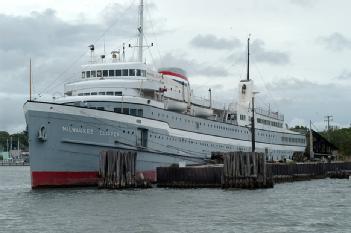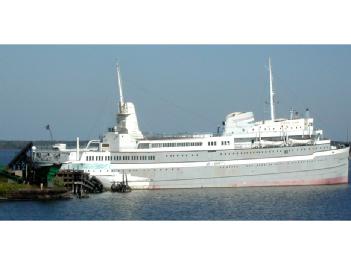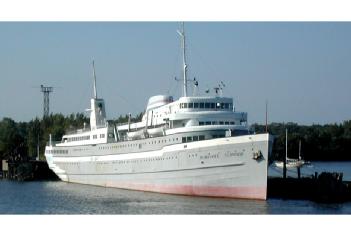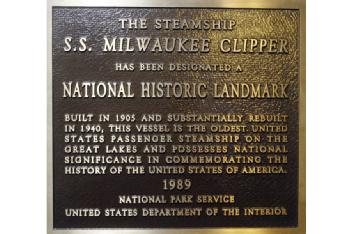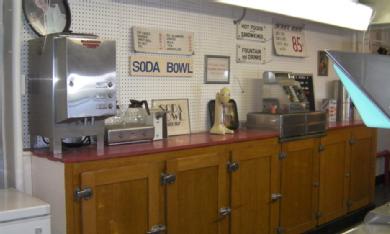
 |
SS Milwaukee Clipper |
49441 Muskegon, MI, United States of America (USA) (Michigan ) |
|
| Address |
2098 Lakeshore Dr.
|
| Floor area | unfortunately not known yet |
Navy / Watercraft
- Model Ships
- Combustion engines/generators/pumps
- Telephone / Telex
- Radar
- Historic Engineering Landmarks
|
Opening times
|
|||||
|
Status from 11/2019
|
We don't know the fees. | ||||
| Contact |
|
||||
| Homepage | www.milwaukeeclipper.com | ||||
| Location / Directions |
Muskegon is a city in the U.S. state of Michigan, and is the largest populated city on the western shores of Michigan. Milwaukee Clipper is currently docked in Muskegon, Michigan at the old Grand Trunk Ferry dock. |
| Description | SS Milwaukee Clipper, also known as SS Clipper , and formerly as SS Juniata, is a retired passenger ship and automobile ferry that sailed under two configurations and traveled on all of the Great Lakes except Lake Ontario. The vessel is now docked in Muskegon, Michigan. Her story begins on December 22, 1904, in Cleveland, Ohio, at the shipyards of the American Shipbuilding Company. Christened Juniata when launched, she was built for the Anchor Line, the Great Lakes marine division of the Pennsylvania Railroad. As originally built, she had a riveted steel hull and a magnificent wooden superstructure. For the Pennsylvania Railroad, she carried passengers and freight between Buffalo, New York and Duluth, Minnesota until 1915. That year, the anti-monopoly Panama Canal Act, which forbade railroads from owning steamships, went into effect. Divesting its marine divisions, the Pennsylvania Railroad sold its Anchor Line along with four other railroad-owned company fleets, to the newly formed Great Lakes Transit Corporation. Under this flag, she carried passengers along her old routes for another 20 seasons. Milwaukee Clipper Juniata sat idle in Buffalo until being sold in 1939 to be rebuilt and used as a passenger ship on Lake Michigan. Juniata was extensively modernized at the yard of the Manitowoc Shipbuilding Company. Her boilers upgraded from coal to run on fuel oil, but she retained her original quadruple expansion steam engine. The old cabins and wooden superstructure were removed and replaced with steel to meet the new maritime fire safety standards The modernized ship featured air conditioned staterooms, a children's playroom, a movie theater, a dance floor with a live band, a soda fountain, bar, cafeteria known for its cuisine, lounges and sports deck, and capacity to carry 120 automobiles. On June 3, 1941, she made her maiden voyage from Milwaukee to Muskegon. As Milwaukee Clipper, she steamed between Muskegon and Milwaukee, as well as excursions throughout Lake Michigan visiting various other ports, for 29 seasons. During World War II, Milwaukee Clipper transported defense materials between Muskegon and Milwaukee. The ship had contracts with auto manufacturers to carry new cars during her entire career. The passenger season was between May and September. After that she was under various limited passenger certificates which allowed her to carry a reduced number of passengers and up to 250 automobiles. 1970 she stopped running her regular route after that year. Museum Ship In 1977, Milwaukee Clipper was purchased by Chicago interests operating out of Navy Pier. Milwaukee Clipper remained a museum ship on Navy Pier. In December 1983, Milwaukee Clipper was listed on the National Register of Historic Places, and in May 1989 the ship was designated a National Historic Landmark. Today, both plaques are on board the ship. The next year (1990), she was sold to Hammond, Indiana where she served as the centerpiece for their large new marina. She was sold on December 2, 1997 for use as a museum in Muskegon, Michigan, her old home port. Milwaukee Clipper is currently docked in Muskegon, Michigan at the old Grand Trunk Ferry dock, undergoing restoration by volunteers of the SS Milwaukee Clipper Preservation, Inc. organization. In the summer season, visitors tour the pilothouse, some staterooms, crew quarters, dance floor, soda bowl, movie theater and more. A large collection of the original Art Deco furniture remains on board. Warren McArthur was the designer and builder of the ship furniture. The frames were all aluminum.
|
[dsp_museum_detail.cfm]
| Data Compliance | More Information |
